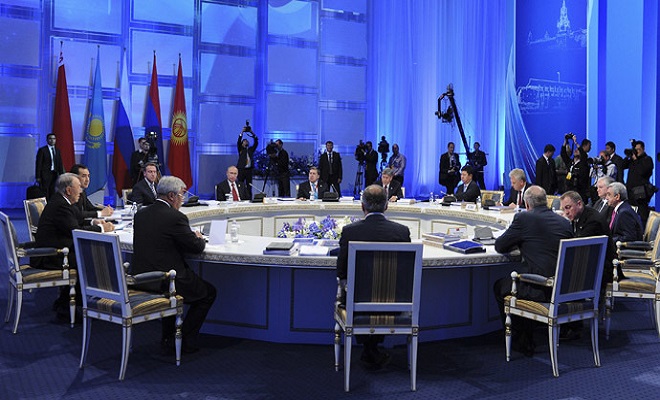 Top officials from Russia, Kazakhstan, Kyrgyzstan, Armenia and Belarus take part in a meeting of the Eurasian Economic Union in Astana. (Reuters/Mikhail Klimentyev/RIA Novosti/Kremlin)
Top officials from Russia, Kazakhstan, Kyrgyzstan, Armenia and Belarus take part in a meeting of the Eurasian Economic Union in Astana. (Reuters/Mikhail Klimentyev/RIA Novosti/Kremlin)
Featured
Berlin & Paris Look East: The Eurasian Economic Union
by Mahdi Darius Nazemroaya , via RT.com:
The Eurasian Economic Union is a reality that may end up costing the US its “perch” in Eurasia’s western periphery as a Common Economic Space is formed.
Former US national security advisor Zbigniew Brzezinski averred the following in 1997: “But if the middle space rebuffs the West, becomes an assertive single entity, and either gains control over the South or forms an alliance with the major Eastern actor, then America’s primacy in Eurasia shrinks dramatically. The same would be the case if the two major Eastern players were somehow to unite.”
This was a clear warning to the elites in the Washington Beltway and Wall Street. Camouflaged behind thinly veiled liberal and academic jargon, what Dr. Brzezinski was saying is that if the Russian Federation and the post-Soviet space manage to repulse or push back Western domination—meaning some combination of US and European Union tutelage —and manage to reorganize themselves within some type of confederacy or supranational bloc, either gaining influence in the Middle East and Central Asia or forms an alliance with China that Washington’s influence in Eurasia would be finished.
Everything that Brzezinski warned Washington to prevent is in motion. The Eurasian Economic Union (EEU)—simply called the Eurasian Union—has been formed by Armenia, Belarus, Kazakhstan and Russia. Kyrgyzstan will be acceding into the Eurasian Union as an EEU member, and Tajikistan is considering joining it too. The Kremlin and the EEU are actively looking for new partners too. Countries outside the post-Soviet space, such as Syria, are even interested in joining the EEU and the Russian-led bloc has already signed an important trade agreement with the Arab juggernaut Egypt. In Southeast Asia, negotiations with Hanoi have also been completed and Vietnam is scheduled next to sign an agreement with the EEU sometime in 2015.












